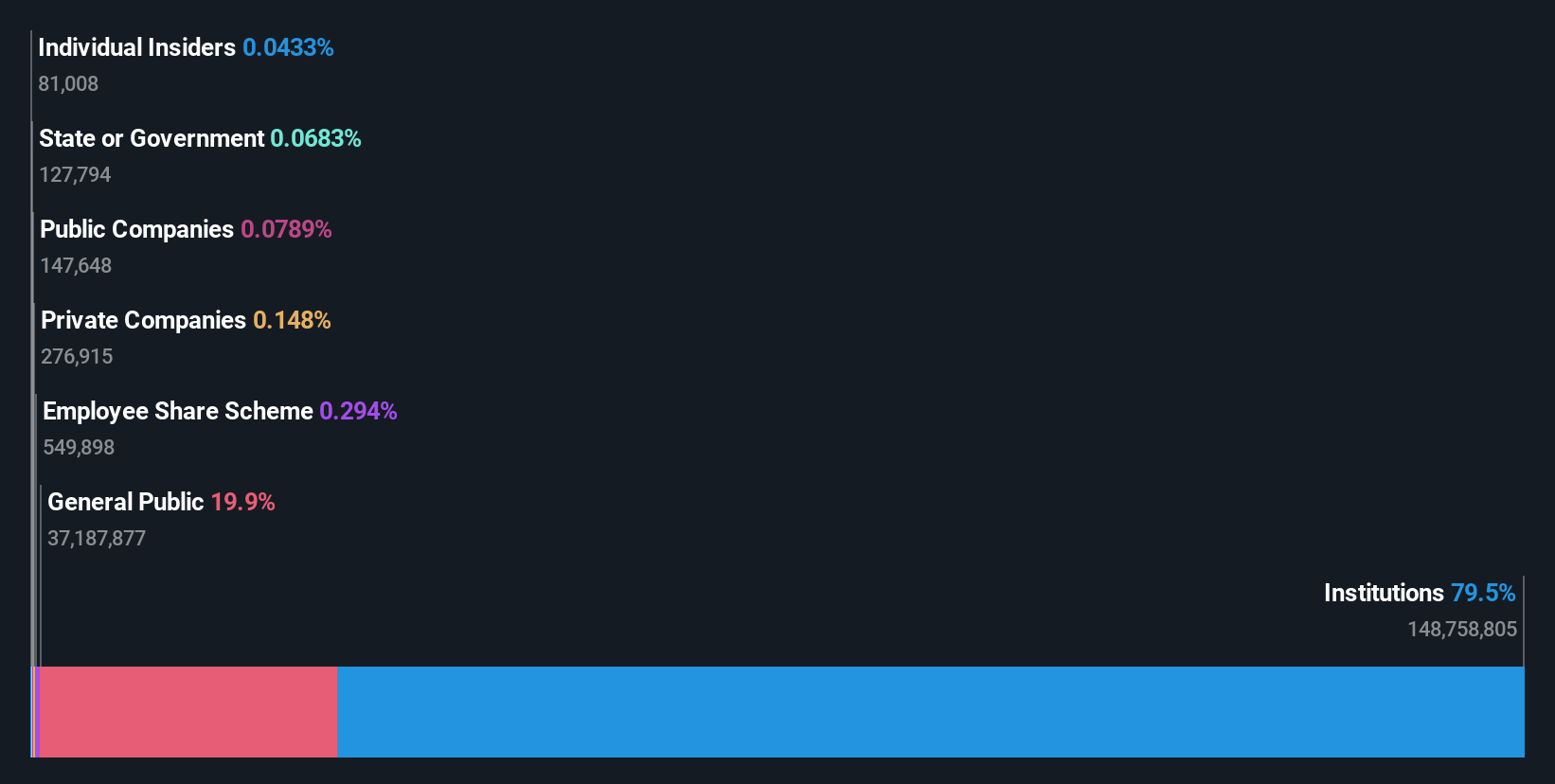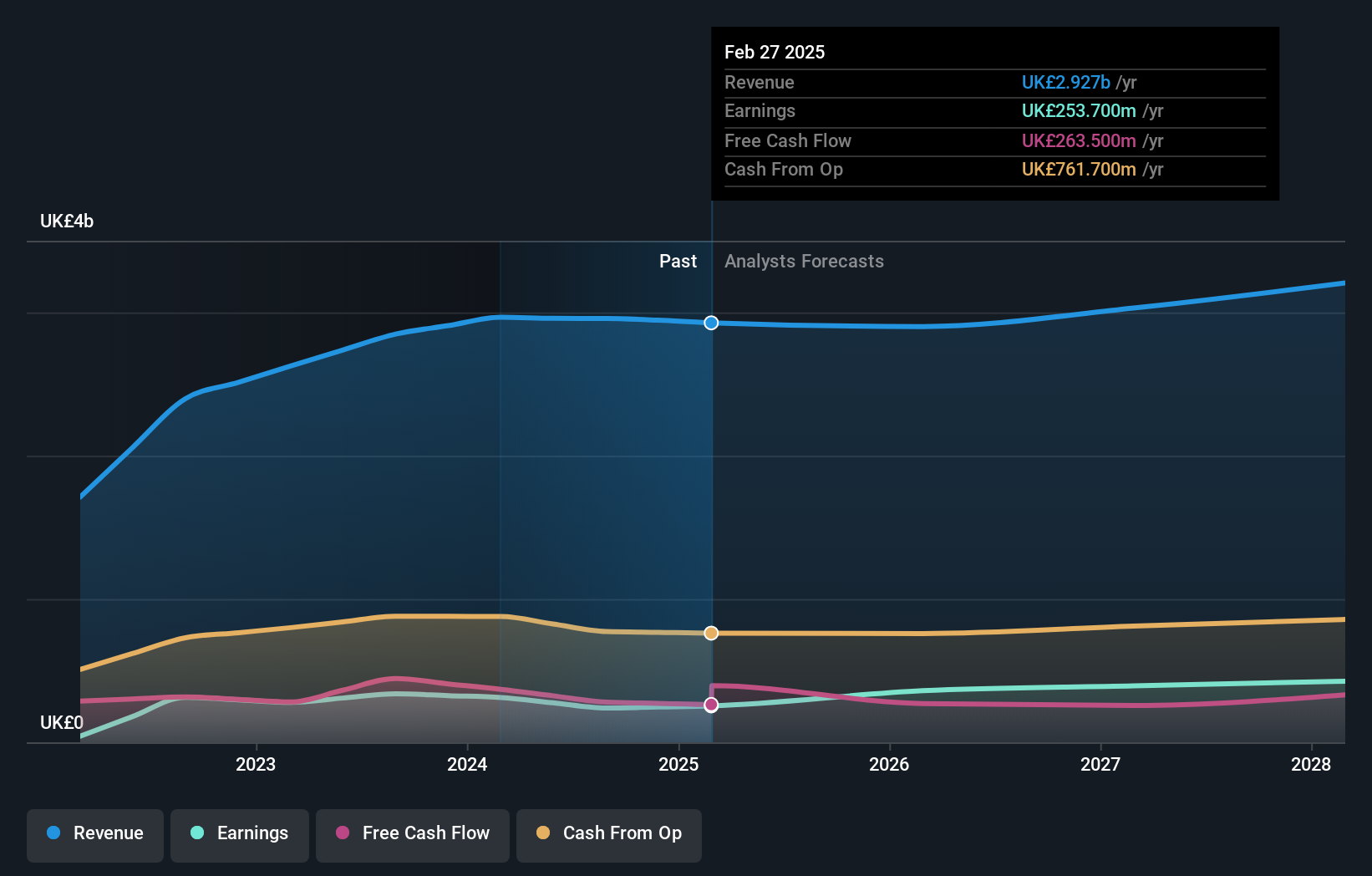- United Kingdom
- /
- Hospitality
- /
- LSE:WTB
Institutional owners may take dramatic actions as Whitbread plc's (LON:WTB) recent 4.3% drop adds to one-year losses

Key Insights
- Given the large stake in the stock by institutions, Whitbread's stock price might be vulnerable to their trading decisions
- 50% of the business is held by the top 21 shareholders
- Insiders have sold recently
If you want to know who really controls Whitbread plc (LON:WTB), then you'll have to look at the makeup of its share registry. The group holding the most number of shares in the company, around 79% to be precise, is institutions. Put another way, the group faces the maximum upside potential (or downside risk).
And institutional investors saw their holdings value drop by 4.3% last week. Needless to say, the recent loss which further adds to the one-year loss to shareholders of 2.8% might not go down well especially with this category of shareholders. Institutions or "liquidity providers" control large sums of money and therefore, these types of investors usually have a lot of influence over stock price movements. As a result, if the decline continues, institutional investors may be pressured to sell Whitbread which might hurt individual investors.
Let's take a closer look to see what the different types of shareholders can tell us about Whitbread.
See our latest analysis for Whitbread

What Does The Institutional Ownership Tell Us About Whitbread?
Institutional investors commonly compare their own returns to the returns of a commonly followed index. So they generally do consider buying larger companies that are included in the relevant benchmark index.
Whitbread already has institutions on the share registry. Indeed, they own a respectable stake in the company. This implies the analysts working for those institutions have looked at the stock and they like it. But just like anyone else, they could be wrong. It is not uncommon to see a big share price drop if two large institutional investors try to sell out of a stock at the same time. So it is worth checking the past earnings trajectory of Whitbread, (below). Of course, keep in mind that there are other factors to consider, too.

Since institutional investors own more than half the issued stock, the board will likely have to pay attention to their preferences. Whitbread is not owned by hedge funds. BlackRock, Inc. is currently the company's largest shareholder with 7.0% of shares outstanding. In comparison, the second and third largest shareholders hold about 4.8% and 4.1% of the stock.
A closer look at our ownership figures suggests that the top 21 shareholders have a combined ownership of 50% implying that no single shareholder has a majority.
While studying institutional ownership for a company can add value to your research, it is also a good practice to research analyst recommendations to get a deeper understand of a stock's expected performance. Quite a few analysts cover the stock, so you could look into forecast growth quite easily.
Insider Ownership Of Whitbread
The definition of company insiders can be subjective and does vary between jurisdictions. Our data reflects individual insiders, capturing board members at the very least. Company management run the business, but the CEO will answer to the board, even if he or she is a member of it.
Insider ownership is positive when it signals leadership are thinking like the true owners of the company. However, high insider ownership can also give immense power to a small group within the company. This can be negative in some circumstances.
Our data suggests that insiders own under 1% of Whitbread plc in their own names. It's a big company, so even a small proportional interest can create alignment between the board and shareholders. In this case insiders own UK£2.3m worth of shares. It is good to see board members owning shares, but it might be worth checking if those insiders have been buying.
General Public Ownership
The general public, who are usually individual investors, hold a 20% stake in Whitbread. While this group can't necessarily call the shots, it can certainly have a real influence on how the company is run.
Next Steps:
It's always worth thinking about the different groups who own shares in a company. But to understand Whitbread better, we need to consider many other factors. For instance, we've identified 1 warning sign for Whitbread that you should be aware of.
If you are like me, you may want to think about whether this company will grow or shrink. Luckily, you can check this free report showing analyst forecasts for its future.
NB: Figures in this article are calculated using data from the last twelve months, which refer to the 12-month period ending on the last date of the month the financial statement is dated. This may not be consistent with full year annual report figures.
Valuation is complex, but we're here to simplify it.
Discover if Whitbread might be undervalued or overvalued with our detailed analysis, featuring fair value estimates, potential risks, dividends, insider trades, and its financial condition.
Access Free AnalysisHave feedback on this article? Concerned about the content? Get in touch with us directly. Alternatively, email editorial-team (at) simplywallst.com.
This article by Simply Wall St is general in nature. We provide commentary based on historical data and analyst forecasts only using an unbiased methodology and our articles are not intended to be financial advice. It does not constitute a recommendation to buy or sell any stock, and does not take account of your objectives, or your financial situation. We aim to bring you long-term focused analysis driven by fundamental data. Note that our analysis may not factor in the latest price-sensitive company announcements or qualitative material. Simply Wall St has no position in any stocks mentioned.
About LSE:WTB
Whitbread
Operates hotels and restaurants in the United Kingdom, Germany, and internationally.
Average dividend payer with mediocre balance sheet.
Similar Companies
Market Insights
Community Narratives




